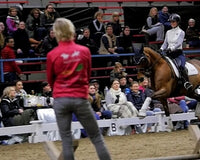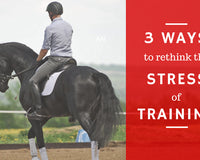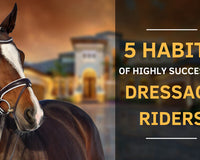
Superman was the best selling comic strip of its time when it first appeared in the 1930's. As the popularity of the comic series grew, it reached million of readers a month. But then something happened. The authors made Superman pretty much invincible. Nothing could stop him, nothing could destroy him, he was always there to save the day. The series became boring and sales plummeted. Who wants to read about someone who has no issues and is always perfect? There was no plot, no tension.
So thats when the authors started with the Kryptonite story. Something that could defeat Superman! There was conflict again, stress and tension in Superman's life, and that made the stories so much more interesting. Now THAT is something worth reading! I think we need to think about our own dressage training in the same way. Dressage is hard. It feels pretty much impossible at times. But thats what keeps it interesting. How boring would dressage be if everyone and anyone could just hop up on a horse and do it perfectly without struggle and stress? The difficulty is what we love; its what keeps things interesting! But what happens when the stress of training for our sport becomes too much? Here are some ideas to rethink the way we look at stress:
Emotional Regulation
The idea that we can live without stress is ridiculous as it is a critical and normal part of being human. It is also something that we often have no control over. But what we can control is how we perceive stress and how we react to it. The Greeks have a word for this, apatheia, which is the absence of irrational or extreme emotion.
Obstacles make us stressed. When our horse becomes tricky in the contact, is struggling to get that clean change, or is not reacting fast enough to our leg aids (all very normal elements in the training of our dressage horses) it frequently leads to a feeling of irritation, frustration and/or stress. When we find ourselves feeling overwhelmed we need to focus on solving problems versus reacting to them. As Gavin de Becker writes in "The Gift Of Fear", when you are frustrated and stressed ask yourself "what am I choosing to not see in this situation? What important elements am I missing because of my frustration and stress"?
And another great question to ask yourself: Does getting upset open the door to giving me more options? Most of the time frustration limites our ability to solve isssues because we are failing in that moment to think logically and rationally. If an emotion doesn't improve the situation it can be considered unhealthy. We all feel these emotions in difficult situations, but remember, the most successful athletes focus on the domestication of their emotions, not in pretending they don't exist.
Think Like A Scientist
Emotions can be a result of irrational fears and thus we can't always anticipate how we are going to feel about a certain situation. By focusing on logic we can bypass our feelings to reach a positive solution to almost every problem. Using logic means asking questions in order to gain valuable feedback so that with enough questioning it is possible to discover the root cause of a problem. Instead of feeling bad over a poor result try to think like a scientist. When a scientist begins an experiment they have a hypothesis on what they anticipate will happen, but if the result isn't what they expected, most scientists are intrigued by why that experiment didn't go as it planned. They ask questions, contemplate, and come up with a new experiment to better understand the problem they are studying. The wrong result is a feedback system that we can use to become more knowledgeable about our craft. Thinking in this way, undesirable results simply translate into a potential for deeper understanding.
So, when it comes to the training of our horses, run experiments. When things don't go as planned, which they most certainly won't, change your perspective to look at it like an opportunity to come up with a new experiment. The more experiments you run, the more successful you'll become. There is a direct relationship between the number of experiments we test on our horses and the better we become at riding.
The more we practice being in a stressful or frustrated place, the better we become at managing it. If you plan on training your own dressage horse, you had better have an appetite for risk! I find the most interesting people in the sport of dressage are those who have struggled the most. Struggle has the advantage of propelling us into a new mental state. Every struggle becomes an opportunity to become a better rider and a better person. Psychologists call this adversarial growth. The struggle is the answer.
Your success in this sport isn't about if you will struggle, it's about how comfortable you can become with struggle.
Socrates had a mean, nagging wife but he said being married to her was good practice for philosophy. Become adept at dealing with struggle and your success in this sport will be infinite.
The Process
The biggest mistake people make is looking too far ahead in their training. We are all riding dressage to reach Grand Prix. When we start riding we are all at A, and we are all striving to reach grand prix, Z. It's so easy to become obsessed with Z that we forget about all the other letters in between. Each of those letters represents critical steps to reaching our end destination. The most successful trainers focus on the process, not on the giant goal. Dressage is about breaking our lofty goal down into small, manageable pieces.
As human beings, we feel the most stressed away from our regular structure. When we have a vision for what we want to happen in the future without a system to get there, we're sure to be plagued with high levels of stress. But if we have a process or a step by step plan to reach our goal, we immediately feel more in control and stress levels drop. Focus on what you can do today with your horse. Focus on small things. Focus on riding in the present. React to what your horse is doing now. Excellence and success in this sport isn't about luck, its a matter of steps. Give yourself smaller, more manageable goals and you'll soon be making progress quicker than you ever thought possible.
Stress Is Important
Make friends with stress. Ask yourself, what advantage do you gain when it all goes your way?
Happy Riding!
THE BRIDLE COMPANY






8 comments
Amanda
Nicely put!!
James Woodard
I’m going to save this, as I think I will need to re read it frequently 👍
Becky
Great article Stephen! Thanks for sharing!!!
Nancy McDonald
Joseph… This was a great article. Loved the analogies.
Linda
Have you been reading Ryan holiday by chance? Its great to bring a bit of philosophy into discussions of dressage.
Connie
Perfect message as I’ve hit a wall and this made me realize it’s okay to experiment and try different methods. Lol, and behold it worked! My mare thanks you as well.
Deanna
Hey Stephen! Great article! My horse is off and it’s going to be a long arduous task rehabbing and basically I have to retrain him and his whole way of using himself….I was pretty downtrodden but I had to find a different way to train because the classical approaches were not working. I started doing some training techniques that I’d always Pooh poohed 💩 before and low and behold it works!!! I’m more open now then ever to learning and learning different things! I realize that this might possibly be a chance to grow and make changes in both my horse and myself that will make us better…Some things that happen make zero sense but if you can find one positive you will start to find more! Love the article! Thanks for sharing it!
Rebecca
This article was exactly what I needed to hear today. Thank you for sharing!